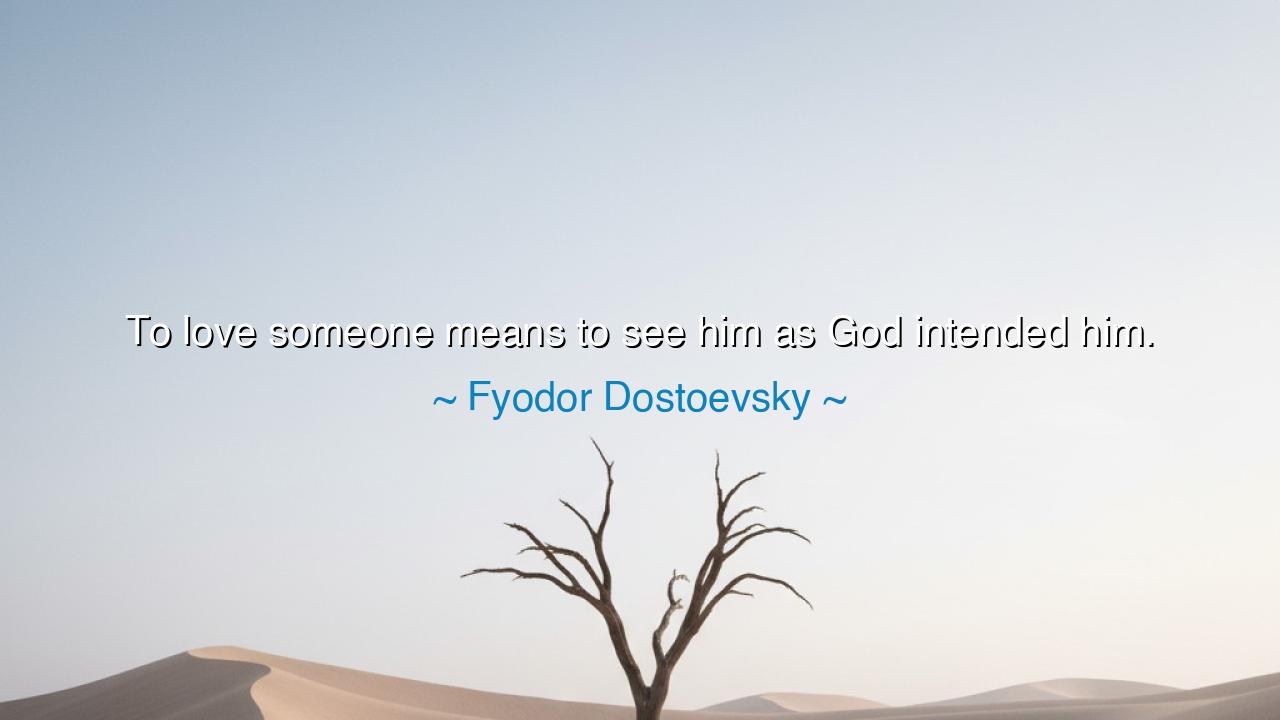
To love someone means to see him as God intended him.






“To love someone means to see him as God intended him.” Thus spoke Fyodor Dostoevsky, the great prophet of the human soul — a man who saw both the darkness and the divine within the human heart. In this single line, he distilled a truth so profound that it transcends all ages and faiths: that true love is not the admiration of perfection, but the vision of potential; not the worship of beauty, but the recognition of sacredness within imperfection. To love, in Dostoevsky’s vision, is to see the divine spark hidden beneath the dust of human frailty — to see, in another, what even they may have forgotten about themselves.
Dostoevsky lived among suffering, imprisonment, and despair, and so his understanding of love was not sentimental but redemptive. He had seen men condemned, broken, and humiliated — yet he believed that within even the most fallen soul, there remains the image of God, the glimmer of goodness that time and pain cannot erase. When he wrote these words, he spoke not of romance alone, but of the sacred act of seeing. For to see someone as God intended is to look beyond the surface — beyond sin, beyond failure, beyond weakness — and to behold the immortal soul striving toward light. It is to say, “Here is a being capable of holiness,” even when that holiness is hidden beneath layers of shame and sorrow.
This truth reveals itself most clearly in stories of forgiveness and transformation. Consider Jean Valjean, from Victor Hugo’s Les Misérables. Once a thief and an outcast, he was transformed not by punishment, but by love — the compassionate gaze of the Bishop of Digne, who saw not a criminal, but a child of God. When the bishop forgave him and gave him the silver he had stolen, Valjean’s heart was shattered and remade. That moment — that act of seeing him “as God intended him” — awakened the divine within him. He went on to become a man of mercy and courage, a living example of Dostoevsky’s vision. For when we are seen with love, we begin to remember who we truly are.
Dostoevsky’s insight is not the naïve belief that people are without fault, but the courageous act of loving through imperfection. To love as God loves is to see the sinner and the saint in the same person, and to hold faith in their goodness even when the world has given up on them. It is the love that Christ showed to Mary Magdalene, to Peter who denied Him, to the thief upon the cross — a love that does not condone evil, but redeems it. When Dostoevsky says “to love someone,” he means to lift one’s gaze from the mud of judgment to the sky of divine intention — to behold not what man is, but what he is meant to become.
And yet, this kind of love demands great strength. It requires patience, humility, and a heart wide enough to embrace suffering. For to love someone as God sees them is to bear their flaws without despair, to hope for their renewal even when they fall. It is to be a mirror that reflects back to them their best self — not the self of pride or ambition, but the self that is capable of goodness, compassion, and truth. In this way, love becomes a creative act, a divine participation in the work of redemption. It does not merely admire; it transforms. It awakens the holy within both the lover and the beloved.
History, too, offers examples of this vision. Mother Teresa, walking through the streets of Calcutta, saw divinity in the dying and the destitute. To others, they were refuse of the world; to her, they were the face of Christ in disguise. “Each one,” she said, “is Jesus in his distressing disguise.” This is Dostoevsky’s meaning brought to life: to look upon another, no matter how broken, and see not the ruin, but the reflection of heaven. It is this seeing — this sacred recognition — that gives love its redemptive power.
So, my child, learn from this teaching: to love truly is to see truly. Do not love for pleasure or gain, nor for beauty that fades, but for the divine image that dwells in every soul. When you look upon another, ask yourself: “What would God see in this person?” And strive to see them likewise — not with the eyes of judgment, but with the eyes of grace. Speak to the goodness in others, and it will rise to meet you.
For in the end, the world is healed not by power or intellect, but by this kind of love — love that sees through the veil of sin and touches the eternal. To love someone as God intended them is to glimpse creation as it was meant to be: whole, radiant, and filled with light. And when you learn to see others so, you too become what God intended you to be — a bearer of love, a maker of peace, and a mirror of the divine.






AAdministratorAdministrator
Welcome, honored guests. Please leave a comment, we will respond soon